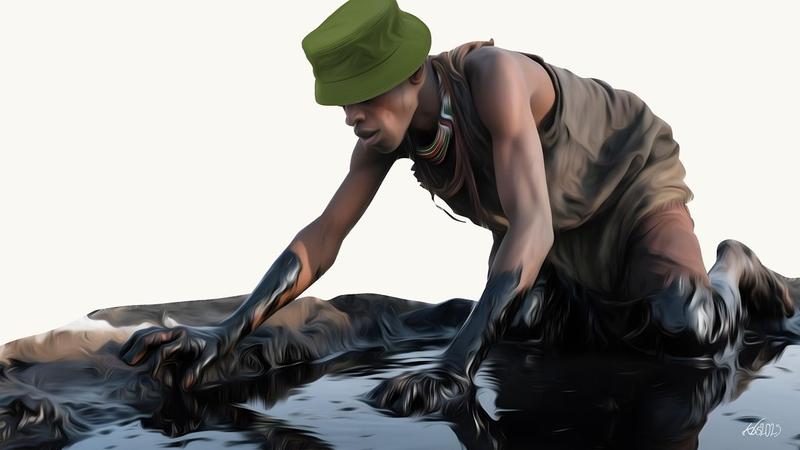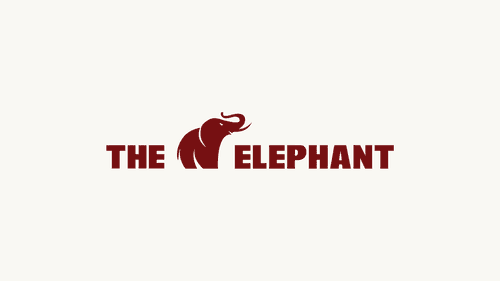It seems inevitable that oil in Turkana will be extracted and turned into money. But who makes sure that the landowners themselves benefit from this wealth? What does “development” really mean in Turkana, and what price do the communities pay for it? Today, most of the oil is still in the ground. A Kenyan oil company now wants to extract it. But there is resistance among the people of Turkana. Against contaminated water, increased kidney disease, miscarriages and animal deaths.
As usual, it is hot on this Friday in June in Lokichar. A camel drinks rusty water from a puddle formed on the metal plates covering the well head constructed by British company Tullow Oil years ago for oil production. This is all that remains of the Twiga 2 drilling site. Goats are grazing right next to it.
The oil would bring development, schools, roads, water points, electricity, jobs and a mobile phone network. This is what Tullow Oil promised the pastoralist communities in Turkana, northern Kenya, when test drilling began in 2010.
Elkanah Elimlin is one of the many people who believed in the promises. He is a calm, guarded man in his thirties who rarely takes off his sunglasses and always wears a button-down shirt, despite the heat. As a resident of Lokichar, he pinned his hopes on the oil company. The national government has always been far removed from the realities of life in this village, which, 15 years ago, was little more than an assemblage of small houses and church buildings, with no network coverage or electricity, and located hours away from the Turkana capital, Lodwar, by dirt road.
While showing around the oil fields, he greets children herding animals. Then Ajore Lowaar comes by. Ajore, somewhat taller and a few years younger than Elkanah, has a motorbike workshop in Lokichar. Like many other locals, both men’s lives are intertwined with Tullow Oil. Elkanah once worked collecting seismic data from special machines that was sent to London. Living close to Twiga 2, Ajore has seen the drilling machines arrive just a hundred metres from the village and has suffered the noise of the drilling by day and the light of the searchlights by night. Now, he is one of 73 people from the area who have come together with the help of lawyers in Nairobi to file a petition against Tullow Oil. They want the oil company to restore the landscapes it has interfered with. Thousands of families rely on these landscapes for their livelihoods.
One of the goatherds is a young woman, Elkanah’s cousin. She wears layers of bead necklaces around her neck, a sign that she does not go to school. “Why are you bringing the goats here?” Elkanah asks her. Elkanah seems irritated by the fact that the animals are grazing and people are gathering right where highly toxic chemicals were used to extract oil. Neither the government nor Tullow Oil has researched the potential dangers posed by the chemicals, says Elkanah. Since the birth of his last child, who has severe developmental disabilities and is still unable to walk or speak at two years of age, he fears that his work at Tullow Oil might be the reason for his child’s disability. Was he exposed to toxic chemicals? “Neither the government nor Tullow Oil has done enough research to ensure our safety,” says Elkanah.
Elkanah is by no means the only one who is worried. People report that their goats are not giving birth as regularly as they used to. Others tell of animals being born with missing limbs. Photos on Elkanah’s phone from 2024 show dozens of animals that died after drinking from a shallow well close to one of the oil wells. At the hospital in Lokichar, a flat, open building where mothers and children wait outside under trees and in the hallway, a nurse shares the observations of the medical staff: There has been a rise in renal and urinary diseases, even in very young children. After we leave, the cancer nurse, who had remained silent during the conversation, sends a message. She has also been observing an increase in bladder and kidney cancers. However, as there is not enough money for many basic treatments, medical studies to examine these observations are out of reach.
Only a few scientific studies have been conducted on water quality and levels in the drilling areas. Two of these were carried out by researchers from Kenyatta University. Of the 11 groundwater samples analysed in the oil production area, eight were found to be contaminated with high levels of heavy metals and salts, exceeding the set drinking water quality standards. The scholars also concluded that increased groundwater abstraction had led to a decline in water levels in the boreholes. The studies also suggest that future oil exploration and production would exacerbate this decline. The small black plastic water tanks that Tullow Oil had installed in villages as part of its corporate social responsibility programme seem neither a good alternative nor a sustainable one. Even kilometres away from the drilling holes, black plastic liners cover many of the traditional round huts in the villages. Designed to prevent toxic waste from seeping into the ground, these liners are waterproof and easy to install. When the camps closed, workers who had lost their jobs took the liners with them to sell.
Amidst mounting complaints and concerns, the Nairobi-based legal support organization Kituo Cha Sheria helped residents build a case. The petition makes many references to the National Environmental Management Authority (NEMA), the public institution responsible for protecting the people of Turkana and their environment. One of the first letters referenced in the study is from 2018 and is addressed to Tullow Oil, calling on them to enforce proper mechanisms for the safe disposal of toxic waste. The petition states that Tullow forced NEMA to withdraw the letter. The same thing happened a year later when the county government followed up on the matter.
During our visit to the NEMA offices, Enock Paule – a quiet man who is not afraid to speak up when necessary, once one of the few children in Kapese village near Lokichar to be sent to school and now chairman of his village – confronted the NEMA County Director for Turkana, Edward Wire, about his concerns for humans and animals. The Tullow camp, and thus his community’s land, has been used to store toxic waste ever since drilling began. Wire told the chairman “not to worry” and advised him to ask Tullow Oil for statistics on changes in groundwater quality, more information on toxic waste disposal and the protective measures taken. Tullow Oil did not reply to the requests.
Given the observed health impacts on humans and animals, the petition also refers to the “violence of development” around Lokichar, highlighting the often overlooked negative consequences of development projects. Since Tullow Oil arrived, the village has changed and the company has taken on some of the government’s responsibilities. It financed the construction of school buildings and an extension to the Lokichar hospital, the Tullow logo of which is visible from afar. The percentage of children attending school has more than doubled compared to when he went to school, says Elkanah. However, Lokichar is now also divided by a four-lane highway. Apart from some trucks and jeeps, the street itself is mostly deserted. Shops and restaurants line both sides of the street. One of these is the Sandiego Hotel, run by Veronica Lowoyan, a tough, self-confident woman in her fifties. In her compound, where the women of her family and some neighbours’ children she looks after are watching a soap opera on TV while cooking ugali, Tullow Oil engineers used to be reliable clients.
While Veronica does not hesitate to voice her concerns about the health issues that could be caused by contaminated water and soil, she is also hoping that an oil company will return. She is hoping for new customers to allow her to complete the construction of a bar that was left unfinished. Her husband worked for Tullow Oil, facilitating contact with local communities, but he has been unemployed since the oil company left. Like Elkanah, who was able to build a house with the money he earned collecting seismic data for Tullow Oil, he now goes to Lodwar every other day in search of a job that will allow him to support his family. Many locals abandoned their traditional lifestyle when working for Tullow Oil, selling their livestock and finding themselves without an income when the company closed down a camp. Sometimes, when the company opened a new drilling site a few kilometres away, the workers followed. This caused conflicts with the villages close to the new borehole as the locals claimed the jobs for themselves.
Traditional governance structures have been overturned by modern developments. However, no meaningful alternatives that stand up for the people have been established. These governance structures follow the exploitative logic of colonial resource exploitation. Tullow’s headquarters are in faraway London, where once the orders for the British colonial government came from. This is where the lawsuits would go next, according to Antony Mulekyo, the lawyer in charge of the case for Kituo cha Sheria. Cases such as that of the Nigerian communities suing Shell in the UK are an inspiration to them – but also a reminder of how far they still have to go to obtain justice. More than a year and a half has passed since they filed the petition in court. Tullow Oil is already trying to drag out the process.
“Companies that rely on the fact that nobody will follow up on air, water and land pollution are a big problem,” says Muturi wa Kamau, who works for the Kenya Oil and Gas Working Group. Often called “Rastaman” because of his long dreadlocks, Kamau has worked in Turkana for the last 10 years. During this time, he has learnt some of the local language, danced at countless weddings and ceremonies, and has grown to love stopping by the Nyama Choma huts at the end of a long day. During this time, he has seen companies get away with things in Kenya that he estimates they would not get away with at home. For the last two years, he has focused on supporting communities to register their land. There is no central land registry in Kenya, and large areas officially belong to the state. But since the 2016 Community Land Act came into effect, communities have been able to officially register their land and obtain a title deed for it as a community. Nevertheless, government authorities do not provide support for land registration.
Now, Muturi travels around remote villages in an all-terrain jeep with local allies in the fight, such as Enock Paule. He is the chairman of his village’s land committee – his community has already registered their land, which gives them a new sense of confidence as they wait for Tullow Oil – or rather, the company that will take over from them – to restart exploiting the oil. This time, promises of jobs, water tanks, camels and a few sodas at a public gathering organized for the community will not suffice. Tullow Oil will need to negotiate land use with them. However, few communities are aware of this, or have the resources to navigate the complicated administrative process.
Before setting off on their tour of the remote village that day, Kamau and Paule pass by the county government building. There are jeeps parked in front of the building and a woman selling bananas. Inside, the secretary is setting up in the dark; there has been a power cut. The County Government Chief Officer for Energy, Triza Amoni, arrives late and receives Kamau and Paule in her office. Speaking about Tullow Oil’s toxic waste management, Amoni explains that it is a pilot project, which makes it difficult to implement without any experts in place. But when asked about the ideal scenario for future oil exploitation, however, she says that she is constrained by budget priorities such as water, health and governance, and lacks the capacity to engage directly. Amoni deflects responsibility to the investors and suggests inviting NGOs to take over the government’s tasks. The national government is far away in Nairobi – “Downtown Kenya”, as the capital and its surroundings are called here in Turkana.
Today, most of the oil is still in the ground. Last year, Tullow Oil announced that commercial production would finally begin in 2028, only to sell its Kenyan assets to Gulf Energy in April 2025. Gulf Energy is a company managed by Francis Njogu, a close ally of President William Ruto. It is estimated that Njogu earned KSh1.9 billion (US$15 million) from his 20 per cent stake in the company when Gulf Energy was sold to French company Rubis Energy in 2020. Tullow has reserved the right to buy back 30 per cent of the shares in case the project proves successful. The handover process will take years, with the final payments scheduled for 2030.
Meanwhile, the Esanyanait assembly of elders is meeting under the acacia trees as the sun sets. Most of them are sitting on the small wooden stools which they always carry with them, discussing how to approach the new “owners” of the oil fields. Only those who have been initiated into the circle of elders are permitted to join them. At the end of the assembly, as dusk is setting in, the two goats that Muturi brought are slaughtered in the traditional Turkana way: with one deliberate stab to the heart. Meanwhile, others prepare an open fire on which to roast the meat. An elder wearing a traditional hat with a feather explains that according to Turkana traditional law, if he offers someone a goat, the right hind leg shall remain with him, the owner of the goat. Locals apply this guideline to any kind of exchange – including the oil.
–
This article was developed with the support of Journalismfund Europe.



